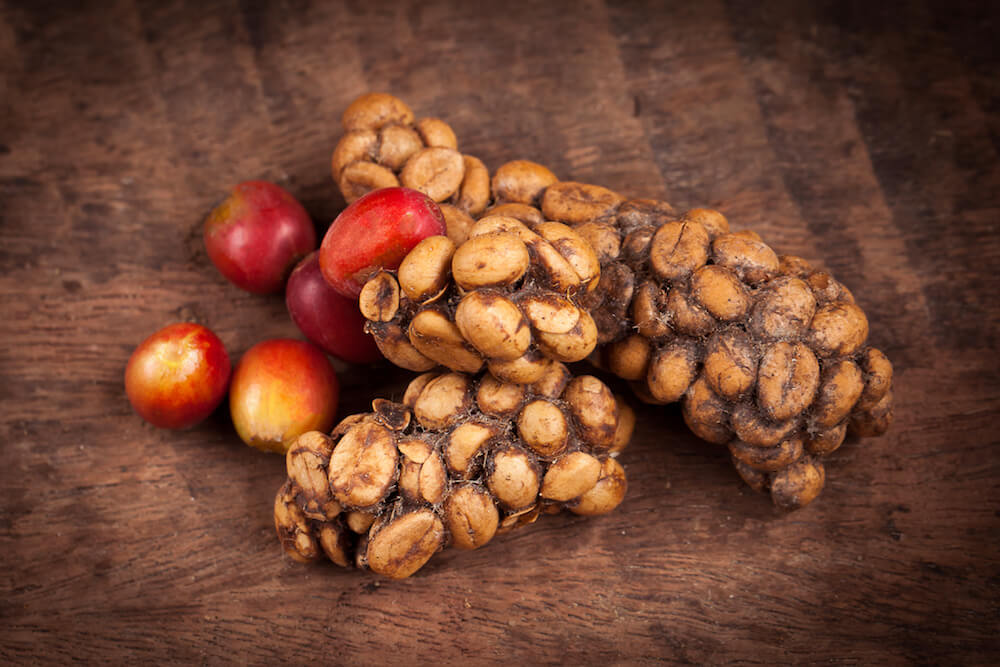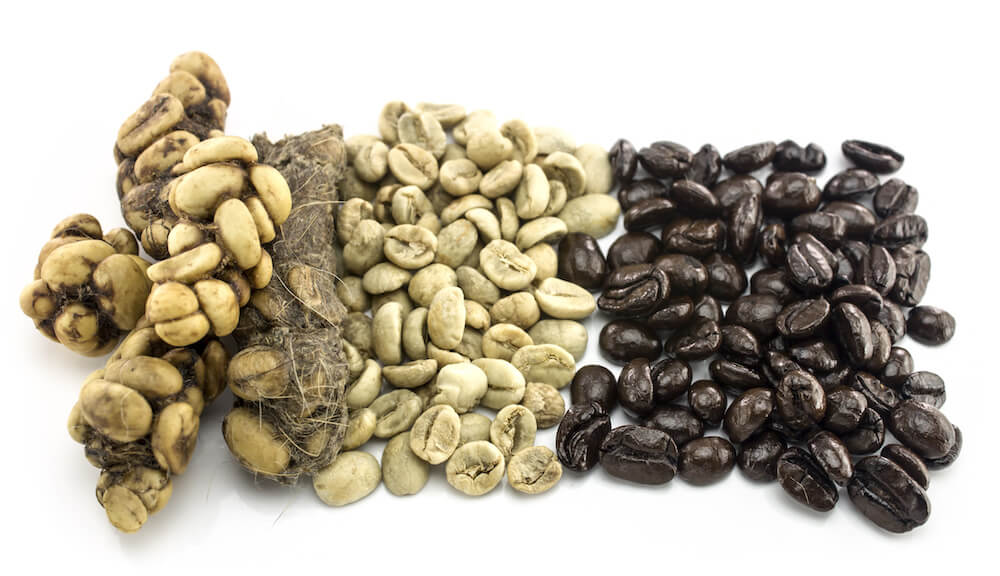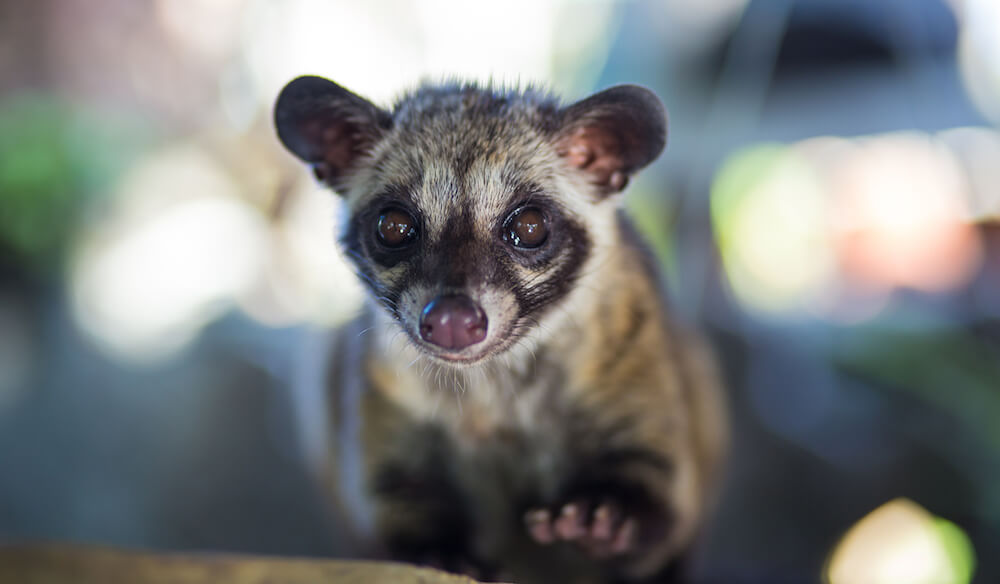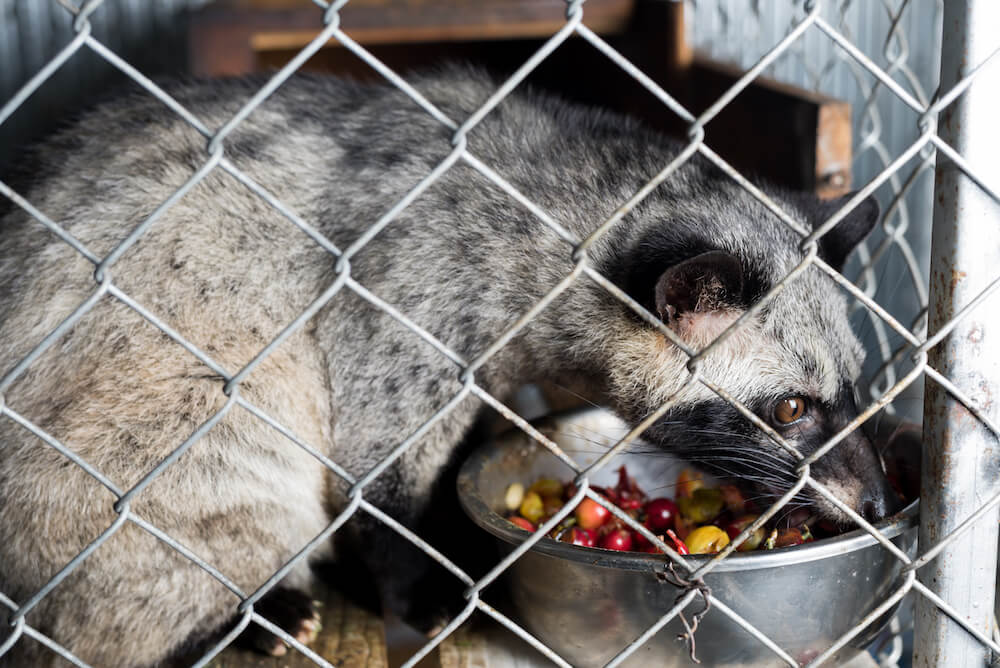
If you’re looking for a gift for a coffee lover, there are many enticing choices beyond the new Starbucks blend you can buy pre-packaged at the grocery store. Do a little searching and you’ll find exotic, renowned (and sometimes very expensive) coffee beans from around the world, all boasting their own unique flavor profile and history. Any coffee lover would appreciate a pound of Moloka’i beans grown in the volcanic soil of the Hawaiian Islands, or some of Jamaica’s famous Blue Mountain coffee. Or how about a few pounds of beans from Ethiopia, the original home of coffee, where the crop has been cultivated for over a thousand years?
But there’s one type of coffee that stands out as the most unique. And interestingly enough, its uniqueness has nothing to do with the type of bean. It’s called Kopi Luwak, or sometimes “civet coffee”, and it’s the most expensive in the world.
But before you put down a big chunk of change for a small package of Kopi Luwak, there are a few things to know about it. There is a lot of buzz around this product, but also a fair bit of controversy and a whole lot of deceptive practice. In fact, if you don’t conduct a little research before making a purchase, there’s a good chance that what you’ll be getting isn’t Kopi Luwak at all.
What is it?

As we mentioned above, Kopi Luwak is also referred to by some people as “civet coffee.” That’s because it is harvested from the dung of Asian palm civets in Indonesia. You read that right. Asian palm civets eat coffee cherries (the fruit that surrounds the coffee bean), but while they digest the cherry, the bean passes through their system. Their droppings are then collected and cleaned, and the beans are roasted like any other coffee.
So what makes Kopi Luwak special? Certain enzymes in the palm civet’s digestive tract alter the way the coffee tastes. This was discovered by Indonesian plantation workers, who were forbidden by the colonial Dutch plantation owners from sampling the coffee they were growing. When they found that civet droppings contained whole coffee beans, they began gathering, cleaning, and brewing the beans themselves. Eventually, word got back to the Dutch owners about the unique taste of this civet coffee, and it became a commercial product.

The people who enjoy Kopi Luwak like it for its smooth, subdued flavor. It is often more full-bodied than regular coffee, earthier and less bitter. That’s because the palm civet’s digestive enzymes remove much of the acid from the bean, resulting in a more subtle taste without the astringency of traditional coffee.
Fake Kopi Luwak
The sudden surge in attention that Kopi Luwak has gained in recent years has also led to an explosion in the production of fake varieties. While Kopi Luwak has a unique flavor profile, only the most educated, experienced, and discerning of coffee experts (essentially the coffee equivalent of a wine sommelier) can say with any confidence if a cup of coffee is real Kopi Luwak – and in most cases even that is questionable. Therefore, if you’re looking to buy some of this stuff online, you’re going to have to use your best judgment as to whether you’re getting the real thing.
The first indication of whether or not the product is genuine is the price. Real Kopi Luwak is expensive (usually $100 – $600/lb), because a very limited quantity of the bean is ingested and excreted by palm civets every year. Also, wild-gathered Kopi Luwak is very labor-intensive compared to normal coffee. Anyone selling for a bargain basement price is definitely giving you something else.
Unfortunately, at this time there is no official certification for real Kopi Luwak. This is in large part due to the difficulty in determining whether a product contains 100% palm civet digested beans. Many unscrupulous suppliers blend Kopi Luwak with ordinary beans, resulting in a hybrid product that has enough of the characteristics of Kopi Luwak to fool most people.
The other main reason there is still no official certification for Kopi Luwak has to do with the inhumane treatment of palm civets by some plantation owners.
Animal Rights Controversy

Given the high price that Kopi Luwak can fetch, it is not surprising that some plantation owners have taken to capturing palm civets and keeping them in cages. In most cases, these civets are fed a steady diet of coffee cherries – and nothing else. The cramped, unsanitary, and often uncomfortable (not to mention unnatural) conditions of some of these civet farms, coupled with the radically limited diet of pure coffee cherries, has drawn outrage from animal rights activists. How widespread these civet farms actually are is unknown, but this article by National Geographic paints a pretty grim picture.
You can find some suppliers online that claim to use 100% wild-gathered civet droppings when collecting their beans, but to some extent you are taking their word for it. Just as it is very difficult to certify that a supplier is selling real Kopi Luwak, it is equally difficult (if not impossible) to certify that all of a supplier’s beans are wild harvested.
Should You Avoid All Kopi Luwak?
This is a question everyone has to decide for themselves. Most human rights groups, along with some people in the coffee industry, advise just that. Because there is no way to be certain that you are receiving real Kopi Luwak or that all of the beans are wild harvested, some people will tell you to simply stay away.
With that being said, there are some sellers who are pretty transparently scamming you, and some who seem more likely to be legitimate. A crude-looking website with no pictures that sells Kopi Luwak for $30/lb is definitely doing something shady. On the other hand, a website like this one, with multiple pictures of the plantation, a professional presentation, and lots of text detailing the company’s origin and its dedication to fair trade and humane practices certainly feels a lot more trustworthy. Of course, unless you go to Indonesia and visit the plantation yourself you are still taking their word for all of the claims they make, but the website feels legitimate in every way. It’s a judgment call, but one you might make with a certain amount of confidence.
One final option is to buy artificially produced Kopi Luwak. Scientists have isolated the enzymes that produce the desired changes in the coffee as it passes through the civet’s digestive system and designed a way to process coffee beans using these enzymes, resulting in something that apparently tastes just like the genuine article. For anyone curious about the famous taste of Kopi Luwak but put off by the various issues surrounding its production, this might be a perfect compromise. Oh, and it’s a lot cheaper.

